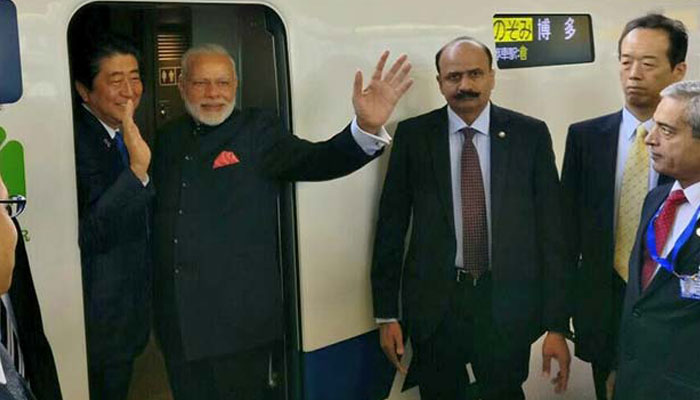TRENDING TAGS :
Know the first Indian Bullet Train | Modi-Abe lay foundation stone
Ahmedabad: India is on its way to achieve another milestone. The country laid foundation stone for the launch work on India's first bullet train in Ahmedabad Thursday.
The occasion was marked by the presence of Japanese Prime Minister Shinzo Abe along with PM Narendra in Athletic Stadium in Gujarat today.
The project which is a joint venture between the Indian Railways and the Japanese firm Shinkansen Technology, signals a big leap for the country's transport infrastructure and overburdened railways.
Also Read: Japanese Prime Minister Shinzo Abe to reach India today on two-day visit
Here are some crucial points you should know about the Bullet Train of the country:
The bullet train, for the first rail link, is expected to cost Rs. 1.10 lakh crore.
The first route will be from Gujarat (Ahmedabad) to Mumbai vice versa.
It will have the capacity of carrying as many as 750 passengers.
The train is expected to run at more than double the maximum speed of the fastest train in India(an average speed of 250 km per hour with a top speed of 320 km per hour).
The route is at 508 km stretch and 92 per cent of it will be elevated. Rest six per cent will e in tunnel and two per cent will be on ground.
Over 460 km of the route will be on elevated track, 27 km inside the tunnel and the remaining 13 km on the ground.
You may also Read: Rahul Gandhi’s ‘Dynasty politics’ statement gets a hit back from BJP
The high speed train will also pass through the country's biggest tunnel of 21 km, of which seven km will be under the sea.
Japan has promised to fund 81 per cent of the entire project in soft loans. It will give these loans at an interest rate of 0.1 per cent, with repayment over 50 years.
First bullet train is expected to run in less than five years (By 2022, when India completes 75 years of independence). It will connect Mumbai and Ahmedabad with a total of 12 stations.
The travel time will be reduced from eight hours to a little over three hours if it stops at all stations and around two hours if it stops at only four.



